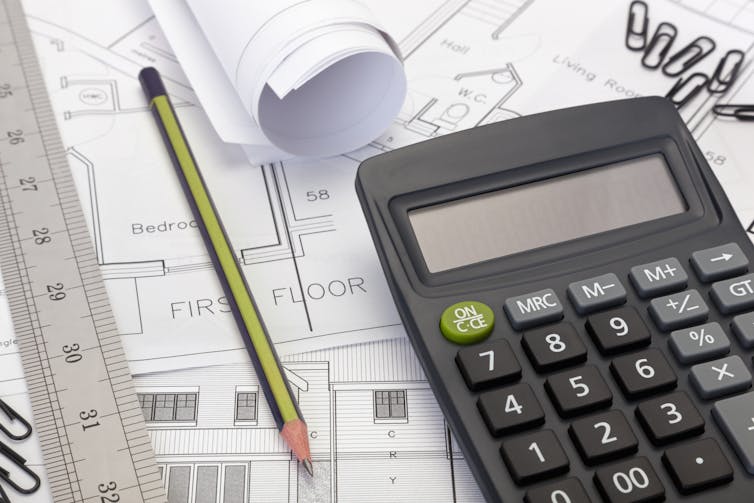How much can I spend on my home renovation? A personal finance expert explains
- Written by Gregory Mowle, Lecturer in Finance, University of Canberra
Home renovation has long been something of a national sport for many Australians, but community demand for home fix-ups has reached fever pitch since the pandemic.
If you’re lucky enough to own a house — and able to afford a renovation — chances are you’ve found yourself wishing for a better work-from-home area. Or perhaps you’ve thought, “If I can’t travel and am to spend all this time at home, I may as well make it more pleasant around here.”
Add to that the HomeBuilder grant and you get a market where builders are in high demand[1], architects[2] are run off their feet and the cost[3] of renovating is going up.
How, then, to decide how much you can afford to spend?
There are no easy answers, and a lot depends on property market conditions where you live, how much financial risk you’re willing to tolerate and how much you’re prepared to forgo luxuries in other parts of life.
But as an ex-financial counsellor and former consumer credit educator for the Australian Securities and Investments Commission (ASIC), here are the questions I’d encourage you to ask yourself to help you decide how much to spend.
Read more: What adds value to your house? How to decide between renovating and selling[4]
How much extra would it cost me each month, even if interest rates went up?
Start with thinking what you want to do and getting a good idea of how much it’s going to cost. Then, factor in extra[5] for unexpected surprises along the way.
Once you have a rough idea of how much you want to borrow to fund your renovation, plug it into a loan calculator with your current lender or on the MoneySmart website[6]. Add on a couple of percentage points to account for the assumption interest rates might not stay at current historic lows.
It’s a good idea to see if you could afford the monthly repayments even if mortgage interest rates increase quite a bit in years to come.
Can I drive down other household costs?
At this point — although this is a good thing to do at any time — look for ways to reduce household costs.
Are you getting the best possible interest rate from your lender? If you are on a variable rate, you can tell them, “I am thinking of borrowing more but I notice the rate you have on my loan on is higher than others are offering.” Often they will knock something off your interest rate straight away. If you are on a fixed rate, you could change to another lender but remember to account for break fees.
 Ask yourself: what expenses are coming up in the next few years?
Shutterstock
Ask yourself: what expenses are coming up in the next few years?
Shutterstock
Can you reduce other costs by getting a better deal on car insurance, health insurance, phone and electricity bills? Often you can get better prices just by calling your providers and pointing out their competitors have a better deal.
Think about your upcoming spending and income
What expenses are coming up in the next few years? Will you likely need a replacement car soon? Are schooling costs or childcare fees on the horizon? If you went all in on a renovation and could no longer afford holidays, nights out, entertainment spending — would you be comfortable with that?
Think also about income. If someone in the household couldn’t work due to illness, or wanted to or had to work part-time, how would that affect monthly payments?
If something goes wrong or you have an unexpected medical cost, could you afford it even with the extra debt that comes with the renovation?
As yourself: if there was a drop in my income or a wage freeze, could I sustain payments to the mortgage?
What’s the return on investment?
This is where the sheer craziness of the Australian real estate market comes into play. Even very conservative financial commentators like me are forced to admit that the property market shows no sign of slowing or stalling. It’s quite likely a renovation would drive up the resale value of your house but unfortunately there’s no easy way to find out by how much.
Much depends on where you live. If you are in a regional area where prices have not grown as stratospherically, you might need to plan for a more moderate growth in the value of your house.
If you are fortunate enough to have property in a major capital city, your house value is likely to appreciate even if you don’t renovate. So if your only concern is increasing the resale value, the market may take care of that anyway without the stress of renovation.
There is still a shortage of property in Australia and demand wasn’t even particularly dented by the pandemic.
But past performance isn’t always a reliable predictor of future outcomes. So you need to think about how you’d manage if there was a big shock to the economy or to your household.
Plan for shocks
Ask yourself: how likely is it that I lose my job? If I did, could I reliably get another? How long could I maintain payments if I was unemployed?
Think carefully about job trends in your industry and what you’d do if, years from now, you were made redundant.
There are no easy answers on this one. Each person has to make a judgement call about how well they can tolerate risk.
 Are you getting the best possible interest rate from your lender? Phone them and ask for a lower rate.
Shutterstock
Are you getting the best possible interest rate from your lender? Phone them and ask for a lower rate.
Shutterstock
Decide what matters to you
Ultimately, it’s up to each person to decide what life you want to have over the next decade or more.
It’s all well and good having an improved home but if you can’t afford to travel anywhere or ever have a night out again, you need to factor that in.
If you can afford to see an independent financial adviser, it is not a bad idea before you launch into a big financial decision. You could also consider seeing a free financial counsellor who is independent of any lenders. They can be contacted on 1800 007 007 or through the National Debt Helpline[7].
Read more: Mortgage deferral, rent relief and bankruptcy: what you need to know if you have coronavirus money problems[8]
References
- ^ high demand (www.abc.net.au)
- ^ architects (www.architectureanddesign.com.au)
- ^ cost (www.abc.net.au)
- ^ What adds value to your house? How to decide between renovating and selling (theconversation.com)
- ^ extra (www.domain.com.au)
- ^ MoneySmart website (moneysmart.gov.au)
- ^ National Debt Helpline (ndh.org.au)
- ^ Mortgage deferral, rent relief and bankruptcy: what you need to know if you have coronavirus money problems (theconversation.com)
Authors: Gregory Mowle, Lecturer in Finance, University of Canberra







